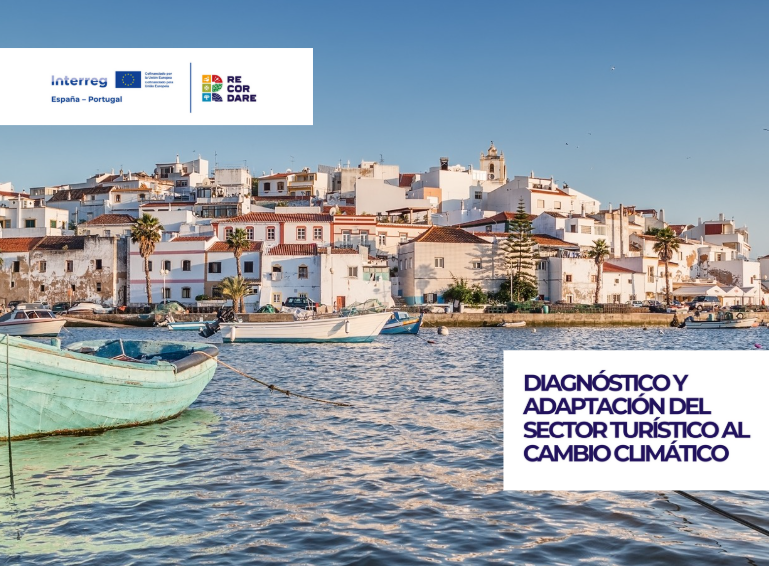The RECORDARE project (POCTEP 2021-2027) has recently conducted a study on the tourism sector in Spain and Portugal that reveals the deep vulnerability of their predominant tourism models to climate change and highlights the critical need to implement adaptation and sustainability measures. Despite a high risk perception, the sector shows a low level of preparedness in concrete actions, especially at the small business level.
Tourism is one of the main sources of income for both Spain and Portugal, attracting mainly visitors from Central and Northern Europe, who seek, among other factors, the “good climate.” However, this crucial resource is being altered by global warming, with direct impacts on tourist comfort and activity conditions, as well as contextual effects on ecosystems.
Tourism Models Under Threat
-
Sun and Beach Tourism: This model, which attracts the largest number of tourists worldwide and in both Iberian countries, faces serious risks. The increase in summer temperatures could cause a “tourist exodus,” severely compromising its long-term viability. It is expected that the loss of climatic comfort in southern and eastern peninsular areas will make temperatures unbearable in the central summer months, diverting tourists to cooler zones. A reduction of up to 20% of tourism from Central and Northern Europe by 2080 is estimated, which could mean a decrease of between 0.6 and 7.7 million overnight stays in Spain for the same year, and a drop in the Spanish tourism GDP of between 0.67% and 0.86%.
-
Urban Tourism: Cities, with their cultural and event offerings, are highly vulnerable to climate impacts, especially coastal ones. They must balance residents’ needs with tourist influx, managing their carrying capacity sustainably. Actions such as creating climate shelters in existing facilities and marking cool routes are already being implemented, although these are not widely known by tourists.
-
Rural and Nature Tourism (RECORDARE): Although less dependent on direct climatic resources than sun and beach or snow tourism, this modality, key for the RECORDARE project, fundamentally depends on the landscape and natural ecosystems. Phenomena such as the loss of snow areas, forest destruction by fires, and water source reductions due to droughts are already altering the attractiveness of these territories, severely affecting competitiveness and employment in these areas.
The Urgency of Adaptation
Climate change impacts are a reality that requires urgent adaptation measures to mitigate effects and increase resilience. Although the tourism sector has been aware of these effects for years, the “Report on the adaptation of the economy to climate change” (KPMG, 2023) highlighted the sector’s low preparedness level. Planned investment in adaptation not only prevents damage but can also create new economic activities and employment opportunities, promoting a more resilient economy with net economic benefits of between 2 and 10 euros for every euro invested.
Both Spain, with its Recovery, Transformation and Resilience Plan (PRTR) and the Sustainable Tourism Strategy in Destinations, and Portugal, with its +Sustainable Tourism Plan 2020-2023 and Tourism Strategy 2027, have established frameworks to promote sustainability. However, local action is essential due to urgency and the direct involvement of social and business actors.
Challenges in Implementing Adaptation Measures
The study of tourism businesses in the RECORDARE project territory (Fundão in Portugal and municipalities in Salamanca, Spain) through a self-diagnosis survey reveals a challenging scenario in implementing adaptation measures.
-
Energy Control and Monitoring Systems: Adoption is low in both regions. 43.4% in Salamanca and 50% in Fundão have not implemented these systems. This suggests lack of economic, technical resources or knowledge, and limited perception of their benefits.
-
Water Consumption Adaptation and Management: A considerable portion of businesses has not integrated significant strategies. 37.2% in Salamanca and 45.5% in Fundão have not implemented water management measures.
-
Implementation of Smart Lighting: Adoption is moderately low. 43.5% of businesses in Salamanca and 41% in Fundão do not use smart lighting.
-
Efficient Air Conditioning Implementation: Intermediate levels of implementation prevail. About a quarter of businesses in both regions (28.3% in Salamanca and 27% in Fundão) have not taken steps toward efficiency in this regard.
-
Incorporation of Renewable Energies: Adoption is moderate. Around one-third of businesses (34.3% in Salamanca and 35.7% in Fundão) have not incorporated renewable energies.
-
High-Efficiency Coatings and Insulations: Adoption is moderate. 28.6% in Salamanca and 26.1% in Fundão have not incorporated these improvements.
-
Electric Vehicle Charger Implementation: Adoption is very low. The vast majority of companies (71.7% in Salamanca and 77.3% in Fundão) do not have this infrastructure.
These figures highlight common barriers such as high initial costs, lack of economic or regulatory incentives, and lack of awareness about long-term benefits.
Recommendations for the Future:
To advance adaptation, it is essential to develop awareness campaigns about the economic and environmental benefits of these measures. Economic incentives (grants, soft loans) are needed to reduce entry barriers. Technical support and training are crucial for effective adoption. Finally, sharing success stories can inspire other businesses to invest in these technologies.
Ultimately, climate change adaptation in tourism cannot remain a secondary issue. It is an unavoidable priority on the political and economic agenda of Spain and Portugal to ensure a sustainable and competitive future for the sector.





